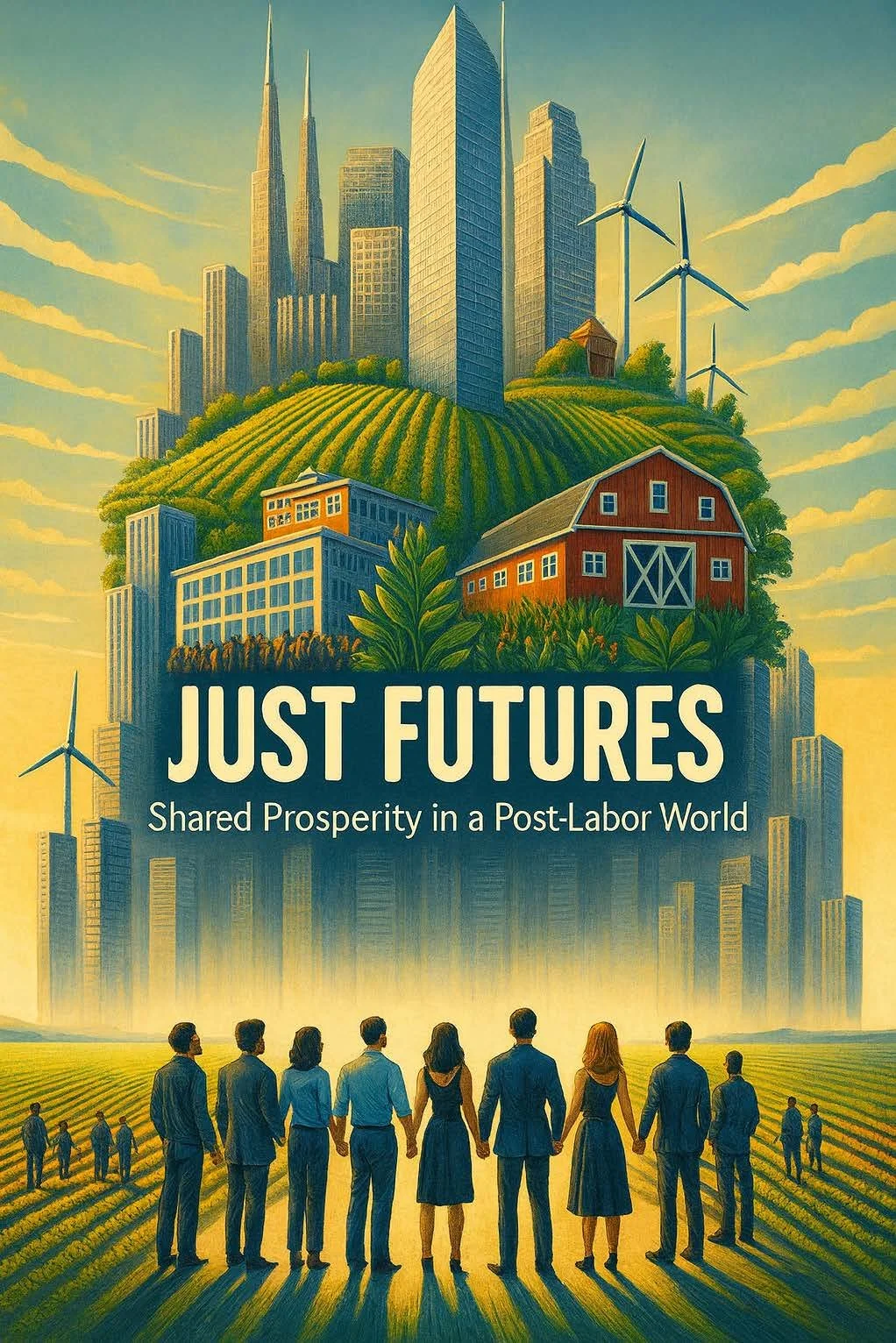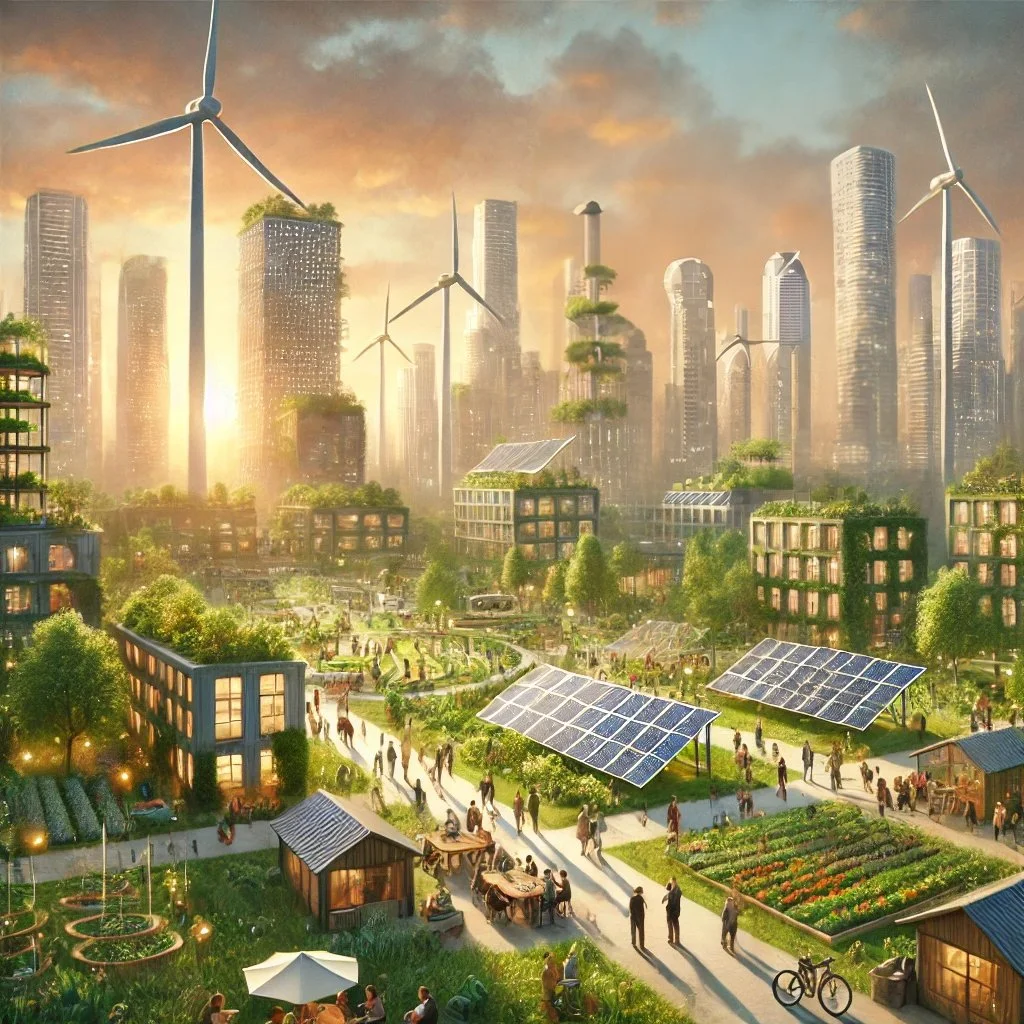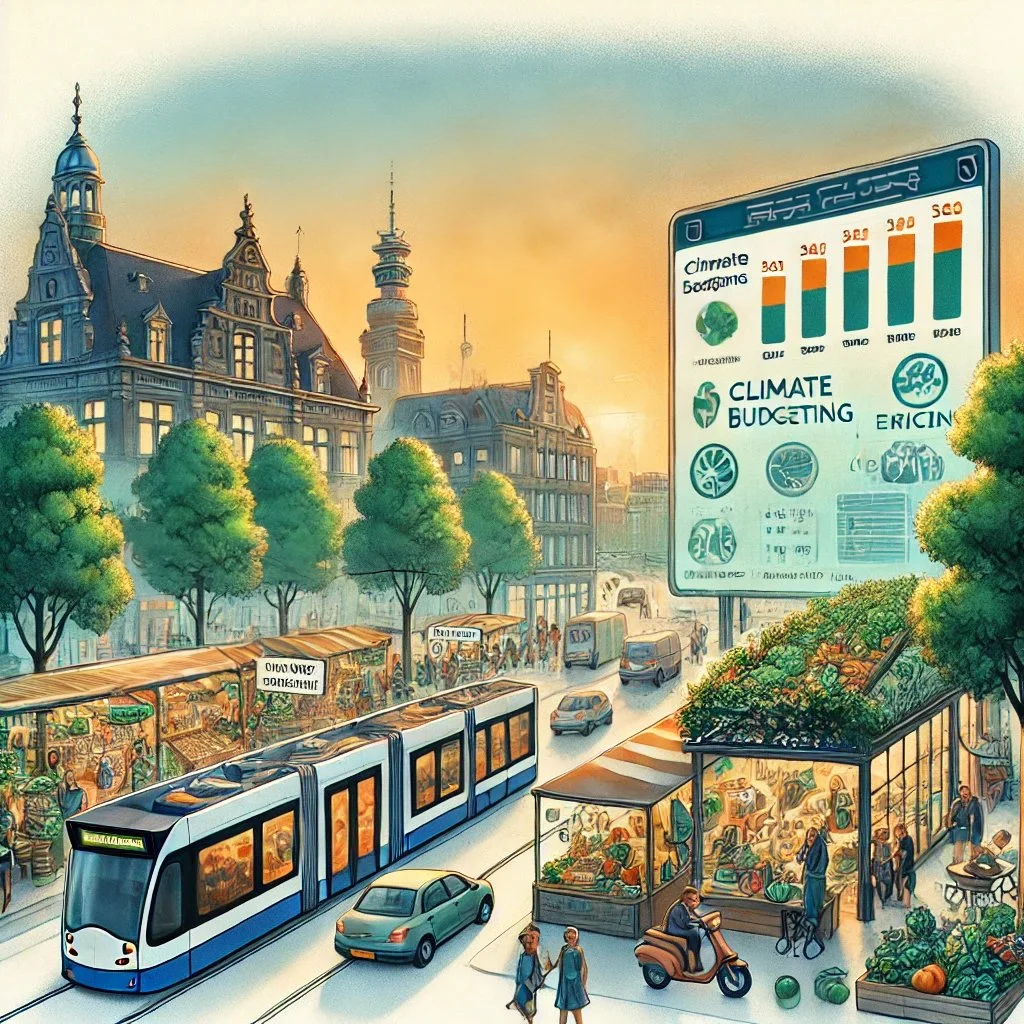As AI reshapes work, value, and belonging, Just Futures challenges the myths of the current economy—spotlighting real-world solutions that are already redefining prosperity, equity, and sustainability in a post-labor world.
PROJECT SUMMARY
What if everything we’ve been told about how the economy works is wrong?
With an increasingly uncertain future looming, what if everything we’ve been told about how the economy works is wrong?
JUST FUTURES explores the real-world models already reshaping prosperity, equity, and sustainability — worker-owned cooperatives, participatory democracy, purpose-driven corporations, new commons governance, universal basic income and cities prioritizing climate resilience — and places them in the context of an urgent, destabilizing force: AI.
Bringing together leading voices on the ground — from futurist thinkers, to leaders in the field of tech & AI, to workers & organizers, to policy-makers, to public intellectuals — JUST FUTURES unpacks how our choices about AI, ownership, and power will determine whether automation becomes a new engine of shared prosperity or a driver of deeper inequality.
PROJECT MISSION
For decades we’ve been presented with a vison of endless growth, and trickle-down promises that would raise all boats. Instead, we've seen rising inequality, environmental devastation, and a shrinking sense of agency over our own lives. Today we find ourselves at a new inflection point: an era of powerful automation and AI that could dramatically reshape work, leisure, and civic life.
JUST FUTURES aims to reframe the debate, by taking a deep dive into how control over technology, capital, and data can be redistributed so the benefits of automation are broadly shared. The project builds on the filmmakers’ work with George Monbiot and the #1 bestselling book and critically acclaimed film "The Invisible Doctrine: The Secret History of Neoliberalism". By capturing the voices, stories, and places driving this change, JUST FUTURES aims to ignite a conversation around what an economy that works for everyone could look like. Our collective economic future is not pre-determined – a reimagining of our system is not only possible, but already happening.
1. THE WAY WE THINK: CHALLENGING OUR FUNDAMENTAL ASSUMPTIONS
Every society runs on a story about what’s possible. For decades, ours has been shaped by the myth of trickle-down prosperity — a belief system that tied growth to progress and labor to worth. Chapter One revisits that story, as well as our implicit social contract, tracing how it brought us to the edge of a post-labor world powered by artificial intelligence. It asks: what happens when the machines we built to serve the economy begin to redefine it?
Drawing on the principles of “Middle-Out” and “Doughnut” economics, Riane Eisler’s vision of a “Caring Economy,” and more recent work around “Regenerative Economics”, this chapter invites the essential conversation about what comes next, and how we might craft a new story of prosperity that values people, planet, and purpose.2. THE WAY WE ENTRUST: PROFIT-SHARING & COLLECTIVE EQUITY
New ownership models offer a crucial lever in an automated economy. From purpose-driven corporate trusts to worker ownership and co-ops, this chapter explores how legal and organizational design can ensure gains from automation are shared — through profit-sharing, collective equity, and governance mechanisms that give workers a seat at the decision-making table. Here we look at models of employee ownership being used to promote more equitable wealth creation. Peter Stavros’ work at global investment company KKR, as well as the employee-owned Publix Super Markets, provide a promising example of what wealth-sharing can look like. Patagonia is perhaps the most notable example of purpose driven trusts – a way of organizing companies to fulfill a higher mission such as profit-sharing or protecting the environment. 3. THE WAY WE SUSTAIN: REGENERATIVE ECONOMICS & THE ENVIRONMENT
Growth has ecological limits. Here we look at municipal climate budgeting, true-cost pricing, and the push to align digital infrastructure and AI with climate goals. Technology needn’t accelerate extraction — it can be designed to optimize resilience, reduce waste, and support regenerative systems.
Oslo’s Climate Budgeting sets yearly emission limits and holds city agencies accountable for staying within them. Remarkably, despite being one of the fastest-growing cities in Europe, the initiative has resulted in a significant decline in emissions – countering the assumption that growth & the environment are at fundamental odds. Meanwhile, in Amsterdam, a pricing system has been created that presents shoppers with the cost of externalities, and the choice to pay the “true price” for a product (the additional amount goes to remediate those harms).4. THE WAY WE WORK: WORKER-OWNED CO-OPERATIVES & WEALTH SHARING
If AI reduces the need for human labor, how do we organize income, meaning, and time? This chapter examines policies and practices — universal basic income experiments, guaranteed public jobs, portable benefits, compressed workweeks, and public investment in care and creativity — that decouple survival from full-time employment and expand meaningful work beyond wage labor.
Specifically, we examine how worker-owned co-operatives offer an increasingly popular, democratized model that runs counter to the traditional corporate structure. This is exemplified by The Mondragon Corporation in Spain, where, for over a century, an industrial-sized worker-owned conglomerate provides a proven alternative future for capitalism.5. THE WAY WE SHARE: AUTOMATION, DATA & THE COMMONS
AI runs on data and models. Who owns and governs those inputs matters. Here we explore models for treating data, algorithms, and compute as public or common resources — from municipal data trusts to open-source models — and mechanisms that let communities set the terms for automation that affects their lives.
While we often think of the commons as tangible resources like parks, air, and water – the commons also include intangible resources such as knowledge, culture, and open digital platforms. Here, with David Bollier – the pre-eminent scholar & advocate for an expanded use & understanding of the commons – we explore how shared resources, ranging from digital spaces to ecological systems, can be managed collaboratively and sustainably.
6. THE WAY WE EMPOWER: PARTICIPATORY DEMOCRACY & THE POLITICS OF BELONGING
Participatory budgeting and civic engagement – both crucial levers that support citizens in re-imagining their role as active, ongoing contributors to the decisions that shape their communities –become even more urgent when automation changes local economies. A powerful tool to this end is participatory budgeting, a process that gives residents direct control over portions of public spending. From Brazil to Chicago, Brooklyn to Reykjavík, this democratic innovation has helped channel public funds into projects that reflect the real, lived priorities of communities – fostering deeper civic engagement, trust and a sense of ownership.
When people come together to debate priorities, allocate resources, and steward what they share, they build the social fabric that markets alone cannot produce. They experience themselves not as isolated individuals competing for shrinking opportunity, but as members of a collective with shared agency, responsibility, and future. This is the “Politics of Belonging” — a reminder that equitable economies are ultimately rooted not just in policy or redistribution, but in the human need to participate, to care, and to be part of something larger than oneself.PETER HUTCHISON
(Director/Producer)Hutchison is an award-winning filmmaker, bestselling author, educator and activist.His film work includes “Requiem for the American Dream” (featuring Noam Chomsky), “The Cure for Hate: Bearing Witness to Auschwitz”, “Devil Put the Coal in the Ground”, “Healing from Hate”, and "The Invisible Doctrine: The Secret History of Neoliberalism”.His books include the bestsellers "The Invisible Doctrine: The Secret History of Neoliberalism”, with George Monbiot (Penguin Books), and “Requiem for the American Dream: 10 Principles of Concentration of Wealth & Power”, with Noam Chomsky (Seven Stories Press).He holds an M.S. in Counseling PsychologyPROJECT TEAM
LUCAS SABEAN
(Director/Producer)Sabean is an editor, producer & filmmaker, whose output includes independent narrative & documentary features, commercial video, and a large body of experimental work.His doc film work includes, “Devil Put the Coal in the Ground”, “The Man Card: White Male Identity Politics”, “Healing from Hate”, “Angry White Men & American Masculinity”, “You Throw Like a Girl: The Blindspot of Masculinity”, and "The Invisible Doctrine: The Secret History of Neoliberalism”. Choreographer Paul Taylor has called his experimental films "superb - like poems made visible." He has an MFA from Boston University in Film Production.ANDREW WANLISS-ORLEBAR
(Co-Producer)Andrew is an accomplished sustainability leader – a multi-disciplinary systems thinker combining vision, strategy and a track record of delivering positive impact. Trusted, collaborative advisor to Fortune 500 C-suite across multiple sectors, he is an entrepreneurial change agent, devising and facilitating programs globally. Building and scaling partnerships to reimagine the impact of business, he works at the intersection of business model, product and culture, and is an advisor to social impact and low-carbon ventures.







